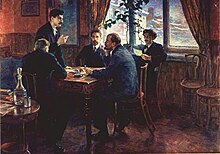
A conference is a meeting, often lasting a few days, which is organized on a particular subject, or to bring together people who have a common interest. Conferences can be used as a form of group decision-making, although discussion, not always decisions, is the primary purpose of conferences. The term derives from the word confer.
History
[edit]The first known use of "conference" appears in 1527, meaning "a meeting of two or more persons for discussing matters of common concern".[1] It came from the word confer, which means "to compare views or take counsel".[2] However the idea of a conference far predates the word. Arguably, as long as there have been people, there have been meetings and discussions between people. Evidence of ancient forms of conference can be seen in archaeological ruins of common areas where people would gather to discuss shared interests such as "hunting plans, wartime activities, negotiations for peace or the organisation of tribal celebrations".[3]
Since the 1960s, conferences have become a lucrative sector of the tourism industry and have evolved into hundred billion Pound per year industry on a global scale.[4] The growth around the world, including in Great Britain, Germany, Philippines, United States and Australia, has led to conferences themselves becoming an industry with buyers, suppliers, marketing, branding and conference facilities.[4]
Modern conferences can be held to discuss a variety of topics, from politics, to science or sport. Many conferences are held on a regular periodic basis, such as annually, biannually (twice per year), or biennially (every other year).
With the development of communications technology, conference holders have the choice of replacing the physical meeting space with a telephonic or virtual form of meeting. This has resulted in terms such as a conference call or video conference.
Conference types
[edit]Conferences can have various formats, topics and intentions.
Conference formats
[edit]- Conference call, in telecommunications, a call with more than two participants at the same time
- Conference hall, room where conferences are held
- Video conference, with the reception and transmission of audio-video signals by users at different locations
Conferences topics
[edit]- Academic conference, in science and academic, a formal event where researchers present results, workshops, and other activities
- Annual conferences within Methodism, the governing structure of certain Methodist churches; despite the name, these are not individual events
- Athletic conference, a competitive grouping of teams, often geographical
- Authors' conference, or writers' conference, where writers gather to review their written works and suggest improvements
- Parent–teacher conference, a meeting with a child's teacher to discuss grades and school performance
- Peace conference, a diplomatic meeting to end conflict
- Press conference, an announcement to the press (print, radio, television) with the expectation of questions, about the announced matter
- Professional conference, a meeting of professionals in a given subject or profession dealing with related matters or developments
- Settlement conference, a meeting between the plaintiff and the respondent in a lawsuit, wherein they try to settle their dispute without proceeding to trial
- Trade fair, or trade conference
- Unconference or open space conference, a participant-driven meeting that tries to avoid one or more aspects of a conventional conference
See also
[edit]- Conference pear, a fruit, a cultivar of European pear
- Conference call, a telephonic meeting
- TED (Technology, Education and Design) Talks and TEDx conferences
- List of Allied World War II conferences
- Summit (meeting)
- Symposium (disambiguation)
- Convention (meeting)
- All pages with titles containing conference
- All pages with titles beginning with conference
References
[edit]- ^ "Definition of CONFERENCE". merriam-webster.com. Retrieved 2022-03-20.
- ^ "Definition of CONFER". merriam-webster.com. Retrieved 2022-03-20.
- ^ Montgomery, Rhonda J. (1995). Meetings, conventions, and expositions : an introduction to the industry. Sandra K. Strick. New York: Wiley. ISBN 0-471-28439-4. OCLC 42785679.
- ^ a b Rogers, Tony (2003). Conferences and conventions : a global industry. Oxford [England]: Butterworth-Heinemann. ISBN 1-4175-0740-3. OCLC 56035870.